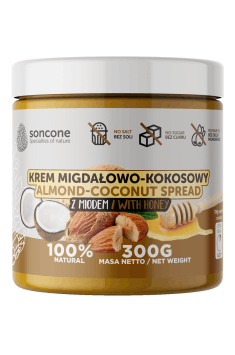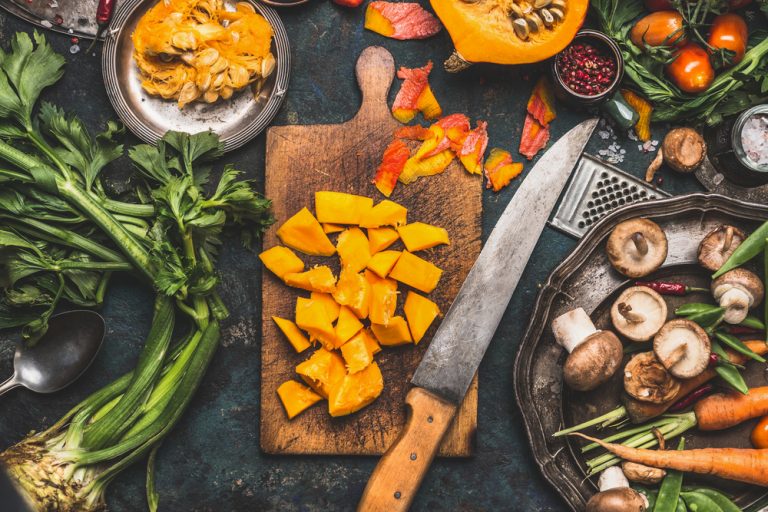Autumn is the time when it’s getting grey and cold outdoors, the days are shorter, there’s less sun, and the wind is blowing more often. Such an aura can promote bad mood, drowsiness, lack of desire to leave the house, and colds. Yes it may be, but it does not have to. What to eat in the autumn to add energy, good humour and not to get a cold? Autumn is a particularly important time to provide not only energy but also valuable vitamins and minerals together with food.
Fat fish
Fat sea fish as well as trout, provide beneficial Omega 3 fatty acids. They are also a source of vitamins, including vitamins D, very important for our well-being. Depression, malaise, reduced immunity are often the result of vitamin D deficiency and too low intake of Omega 3 fatty acids. It’s worth making sure that a fatty sea fish appears on our menu at least once a week, those can be mackerel, halibut, wild salmon, herring or freshwater trout.
Colourful vegetables
The more colours on our plate, the better. Autumn is a perfect season for pumpkin vegetables, as well as paprika, sauerkraut or beetroot.
Pumpkin is a vegetable rich in vitamins and minerals. Contains vitamin C, A, E, K, B6, thiamine, riboflavin, niacin and folic acid. It’s rich in calcium, iron, magnesium, phosphorus, potassium, sodium and zinc. It’s an ideal ingredient in the autumn cream soup. This meal will be rich in vitamins and fibre, filling, low calorie and warming up. Especially when we spice it with the spices referred to later in the article.
Red peppers are a rich source of carotene beta - also called provitamin A. In peppers we also find vitamin A, E, B, and above all a large amount of vitamin C. Crunching raw paprika will help us to limit sweets and strengthen our immunity in the autumn.

Warming spices
In the autumn, it’s worth to be served with spices that warm up, strengthen the body and enrich the taste of dishes.
What kind of spice to use?
Turmeric, curry, hot pepper, ginger, cinnamon, garlic, chili, cloves, cardamom, horseradish, pepper, marjoram. Cinnamon is great for warm porridge as a supplement to coffee and cakes. Curry, turmeric and ginger are great for soups and meat dishes. The latter will also be ideal for teas and infusions.
Complex carbohydrates
Carbohydrates are needed in our diet not only because of the energy supplied. Carbohydrate consumption improves serotonin levels. This is because a large amount of insulin released in response to consumed carbohydrates accelerates the removal of valine, leucine and isoleucine from the plasma. These are the amino acids that compete with tryptophan for transport to the brain.
Serotonin is a cerebral, biochemical substance that affects soothing sleep, well-being and sense of satiety. People who have low levels of serotonin often experience depression, feelings of anxiety, insomnia and tendency to overeat.
Serotonin is needed to produce tryptophan!
When it comes to carbohydrates, it's a good idea to choose these complex, slower energy releases and longer satiety. So you should eat cereal, rice, wholemeal bread and oatmeal, barley, yoghurt. We can, however, also reach for fruit as well as sweet or normal potatoes. Refined products include refined sugar - sweets, sweet rolls, fruit yoghurts, desserts and heavily purified products - white bread.
Dark chocolate
A few chocolate bars are able to help us feel good about ourselves. All thanks to cocoa. Therefore, when choosing a bitter chocolate, note if it’s at least 70%. Phenylalanine in cocoa increases serotonin and endorphins in the brain, improving our mood and preventing depression. Cocoa is also a source of magnesium, calcium and zinc.
Nuts and seeds

Nuts and seeds are rich in protein, healthy fats, fibre, vitamin E, magnesium and B vitamins. Pumpkin seeds, sunflower seeds, walnuts, almonds, Brazil nuts - they work great as an addition to the autumn diet. Almonds and walnuts can be successfully added to porridge. Pumpkin seeds perfectly blend with the aromatic pumpkin soup. Magnesium, lecithin, selenium - contained in nuts and seeds affect brain performance and prevent autumn litter.
Onion, garlic and ginger
Ginger is a powerful spice that has been in use for over 2,000 years. It has a very broad spectrum of action - antibacterial, antiviral, antiparasitic, antioxidant. Garlic has long been known for its bactericidal properties. It even gained the nickname of a natural antibiotic. Regular garlic consumption helps keep you healthy. It’s worth to replace the meat dishes with fresh garlic and ginger. They will have a clear taste and will have many health benefits.
Silage
Pickled cabbage is not only a valuable probiotic but it also provides vitamins, and it’s cheap. Fermentation, which is subjected to cabbage in this process, is due to the activity of lactic acid bacteria and these are our allies. After entering our digestive tract, they colonize our intestines, protecting us from pathogens.
Autumn diet - summarization
In conclusion, in the autumn, in spite of worse weather and shorter days, we do not have to be deprived of energy, less smiling and often cold. It’s worth to take special care of your diet.






